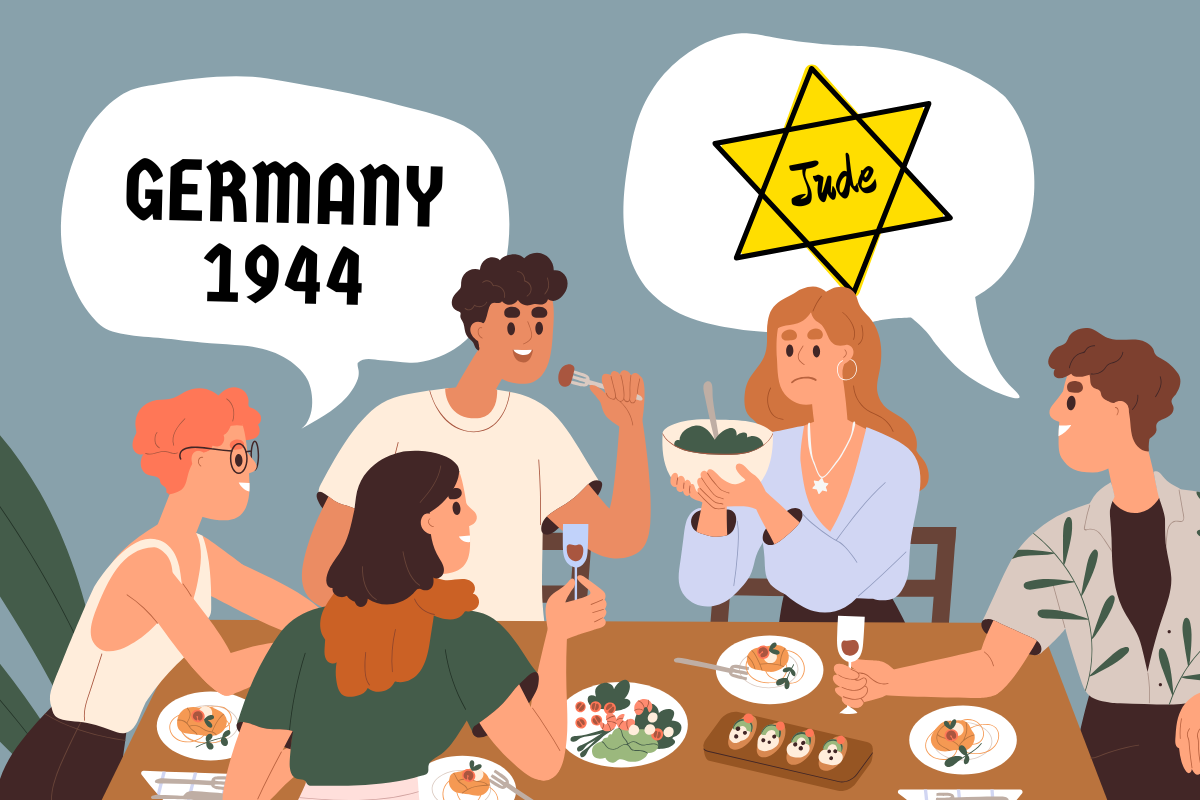Hello and welcome back to Hey Alma’s advice column on all things Jewish life. Read on for advice from our resident deputy managing editor/bossy Capricorn Jew, and submit your own dilemmas anonymously here.
Hey, Hey Alma,
My non-Jewish boyfriend’s family won’t stop bring up the Shoah in casual conversation. How do I get them to stop?
— I’d Rather Not Discuss The Holocaust on a Random Tuesday Afternoon, Please
Dear I’d Rather Not,
Oy! I wish there was a little more context around this question, both for my nosy personal satisfaction and also so I could give you the best possible advice for your particular situation. But the truth is, we’ve all been in situations where a non-Jewish person says something about Judaism or related to Jewish people that we really wish they hadn’t, so unfortunately, I can pull up several anecdotes off the top of my head and fill in the blanks for this question.
Ideally, if this happens, you can simply ask the person to stop. Sometimes another person genuinely doesn’t know when something is not cool, and if you just let them know, they’ll cool it with the inappropriate casual references! That’s an ideal situation — you make a simple polite ask, it’s respected, we all move on. But because you wrote in to Hey Alma, and because you say they “won’t stop,” I get the feeling that perhaps you’ve tried that already.
So your non-Jewish boyfriend’s family loves bringing up the Holocaust, a major generational trauma that all Jews must contend with. We could begin by asking simply: WTF? I am actually quite curious about the nature of their comments. Are they bringing up random facts about the Holocaust? Recommending books they’ve read about it? Are they ‘splaining the Holocaust to you, as if they have a better understanding of this event than you might? Do they want to talk about politics? Are they asking you questions and requesting that you teach them about the Holocaust? Are they making ugly bigoted jokes about Jews and ovens? Or are they truly just casually mentioning it every time you see each other (which does bring me back to my original question: WTF!!)? I ask for clarification here, because I think the way we approach this depends greatly on the other person (or people’s) intent. I’m also curious how close to your boyfriend’s family you feel, how frequently you see them and how willing your boyfriend is to back you up in these situations. Because I don’t have these answers, I’m going to give my advice in a more broad way, and hopefully it will help both our letter writer and also anyone else encountering something like this.
1. Consider intent vs. impact
A popular saying in activist circles is that impact is more important than intent. This means that regardless of what a person was trying to do or convey with an action or phrase, if the result is causing hurt or harm, that’s what everyone involved has to focus on (and rectify!). I do believe that’s true, but I also believe there is space for generosity with people we love. I want to be cautious here, because it can be a slippery slope to make excuses for people we love when they harm us. But what I mean is that sometimes, we can afford to be generous. Think about the nature of these comments. Do you think there is cruelty behind them? Or do you think they’re trying to relate to you, as a Jewish person, in a reallyyyy misguided way? Some people would argue it doesn’t matter, but I believe it does.
In the moment when something hurts or angers us, it’s hard to tell exactly what we think about the other person’s motives. So I want you to take some time when you’re not with your boyfriend’s family and really think about what you think is going on here. Ask yourself the questions I posed to you above. Do you think Aunt So-and-So is trying to connect, or trying to cause harm? It’s possible your next move won’t change regardless, but it’s also possible you might choose a different route depending on these answers. I think the question is worth asking, especially when you’re not emotionally dysregulated or upset in the moment.
2. Decide what your boundaries are
So while I do think the way I personally would react would be different depending on if I felt the family members were intending to cause harm or not, the way you decide to react might be totally different than what I would do. And that’s OK! The important part of this step is figuring out what your boundaries are.
As I’ve written before: The point of a boundary is not to propose ultimatums, try to control another person or punish anyone; it’s simply to keep you both physically and emotionally safe.
In your specific case, I think the key question is to decide if you are going to create a boundary. There is a world where this behavior never stops and you just accept it. I’m not saying that’s the right move — just that many of us maneuver through life dealing with things we really wish wouldn’t happen, often because we’re unable to have a hard conversation to create a boundary. In order to change a situation, you must make a change.
A misconception about boundaries is that they have to be intense, painful or Level 10 No Contact right out the gate. That’s not true. A soft boundary is a perfectly reasonable response to many things in life. My therapist used to have me rate boundaries on a scale of 1-10, 1 being most gentle and 10 being most aggressive. For example, perhaps you decide that any time your boyfriend’s family casually brings up the Shoah, you’ll politely say, “I don’t want to talk about that. Let’s change the subject.” And then if everyone refuses to change the subject, you’ll leave the room for a few minutes before coming back. That’s a soft boundary — I’d rate it, like, a 3. But what if after six months, they still keep bringing it up? Then perhaps you up the ante and say more forcefully, “If you keep talking about the Shoah in casual conversation, I will no longer be able to attend family gatherings.” And the next time they bring it up, you get up and leave for good and do not join any future gatherings unless there is an apology and a commitment to ending the behavior. I’d say that’s a hard boundary — I’d rate it a 9.
3. Talk to your boyfriend and make a plan
The truth is, in my opinion, this is mostly on your boyfriend. This is his family, and they’re much more likely to listen to him than they are to you. He’s gotta tell them to stop casually bringing up the Holocaust!
Pick a time when you’re both calm and relaxed, and let him know what’s going on and why it upsets you. He might get defensive or he may just listen and be supportive. Either way, I would make it clear that you need him to step it up and be a team with you on this issue. Make a plan of action together, and commit to stick with it. I think, if I were in your shoes, this is what I would do:
- Talk to my partner and express my feelings
- Make it clear I need help and I expect them to communicate with their family about this issue
- Come up with some boundaries together about how we’ll be responding if they do not respect the ask
- Make a date for that conversation between my partner and their family to happen
- Check in with my partner and hear how it went
- Stay consistent in our reactions
4. Stay consistent in your response
This is key. Once you express a boundary, you have to follow through on your part of it — otherwise it’s just a preference that you’ve expressed to someone.
Here’s a good template for a boundary: If [behavior that is harmful] is happening, I will [action that you can take on without anyone else in the room changing their behavior].
So let’s say you and your boyfriend have decided that next time you are with his family, if they casually bring up the Holocaust he will interrupt and ask them to stop. Now he has to make sure he follows through on this every time! Humans respond well to routine and can definitely learn to change or modify behavior. The key is sticking to your part of the routine so they can learn their new part, too.
If your boyfriend’s family is unresponsive to soft boundaries, you’ll have to reconvene with him and talk about leveling up to hard boundaries. This is a stressful situation and I wish you didn’t have to deal with it, but I’m hoping that with your boyfriend by your side, you can experience his family changing their ways and finding some new casual topics of conversation to bring up around you. How about that weather, right?!
Do you have a Jewish or Jewish-adjacent dilemma and want our advice? Submit a question anonymously and we’ll do our best to answer it!




